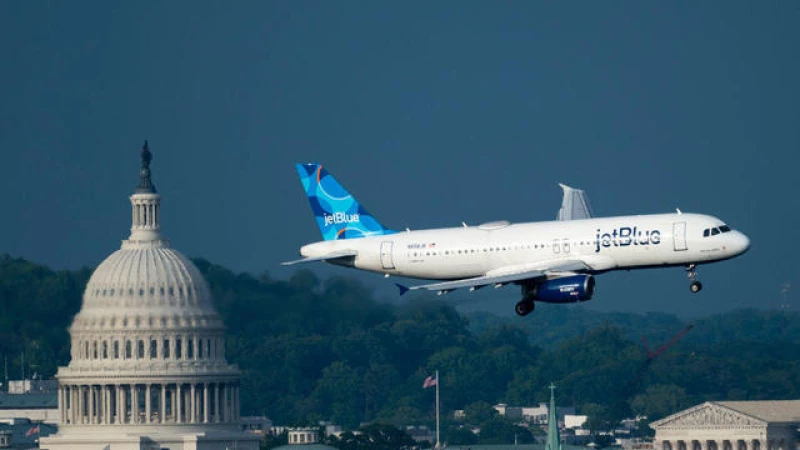Senate Passes $105 Billion Bill to Improve Air Safety and Customer Service
The Senate has passed a $105 billion bill designed to improve air safety and customer service for air travelers, a day before the law governing the Federal Aviation Administration expires.
The bipartisan bill, which comes after a series of close calls between planes at the nation's airports, would boost the number of air traffic controllers, improve safety standards and make it easier for customers to get refunds after flights are delayed or canceled.
It passed the Senate 88-4. The legislation now goes to the House, which is out of session until next week. The Senate also passed a one-week extension that would give the House time to pass the bill while ensuring the FAA isn't forced to furlough around 3,600 employees.
The bill stalled for several days this week after senators from Virginia and Maryland objected to a provision that would allow an additional 10 flights a day to and from the heavily trafficked Ronald Reagan Washington National Airport. Other senators have tried to add unrelated provisions, as well, seeing it as a prime chance to enact their legislative priorities.
Senate Majority Leader Chuck Schumer called for a vote Thursday evening when it became evident that senators could not reach an agreement on amendments before the bill expired. Following the bill's passage, leaders from both parties collaborated to pass an extension, ensuring the law does not expire on Friday. The House had previously passed a one-week extension earlier in the week.
Key Points of the Legislation
The FAA has been under scrutiny since it greenlit Boeing jets involved in two fatal crashes in 2018 and 2019. The Senate bill will oversee FAA operations for the next five years and implement various new safety measures.
Provisions in the Bill
The bill aims to boost the number of air traffic controllers and mandate the use of new technology by the FAA to prevent plane collisions on runways. It also requires new airline aircraft to be equipped with cockpit voice recorders capable of storing 25 hours of audio, an increase from the current two-hour capacity, aiding investigators.
Furthermore, the bill seeks to enhance customer service for air travelers by mandating that airlines reimburse customers for flight delays — within three hours for domestic flights and six hours for international ones. Lawmakers adjusted the bill this week to streamline the refund process for customers, amending language that previously placed the burden on customers to request refunds. This change aligns the Senate bill more closely with the recent regulations issued by President Biden's administration.
Furthermore, the legislation would make it illegal for airlines to charge additional fees for families to be seated together and would triple the fines for airlines that breach consumer protection laws. Additionally, it would mandate the Transportation Department to develop a "dashboard" for consumers to compare seat dimensions across different airlines.
The Federal Aviation Administration (FAA) had warned that if the bill lapsed on Friday, around 3,600 employees could face furloughs without a guarantee of retroactive pay starting at midnight. This would also prevent the agency from collecting daily airport fees that contribute to operational costs, leading to a halt in ongoing airport upgrades.
The FAA clarified that individuals in "safety critical" roles, such as air traffic controllers, would not be impacted if the deadline is missed, ensuring that the safety of air travelers would not be compromised.
Nonetheless, the failure to pass this widely supported bipartisan bill by May 10 represents the most recent setback following months of delays in its approval. It highlights Congress's struggle to enact significant legislation, even when there is broad bipartisan backing.
During the Senate session on Thursday, Schumer called on senators to reach a consensus promptly.
"It is imperative that we avoid missing the deadline as it would unnecessarily heighten risks for numerous travelers and federal workers," Schumer emphasized.
What caused the delay in Senate approval
Virginia Senators Tim Kaine and Mark Warner, both Democrats, were advocating for a vote on their amendment to prevent the increase in long-haul flights at Virginia's Reagan National Airport. They argued that the airport is already operating at full capacity and highlighted a recent incident in April where two planes had a close call, describing it as a "flashing red warning light."
On the other hand, several Western lawmakers have been pushing for more flights at the airport, claiming that the current restriction on long-haul flights is unfair to consumers. Leading this argument is Texas Senator Ted Cruz, the top Republican on the Senate Commerce Committee, who believes that San Antonio should have a direct flight from Reagan National. Cruz blocked the vote on Kaine and Warner's amendment when it was brought up by Schumer just before the final approval.
There is a divide among airlines regarding the proposal for additional flights at Reagan National. Delta Airlines supports the idea of more flights, while United Airlines, which has a significant presence at Dulles Airport further out, has been lobbying against the increase.
Last year, the House passed its version of the FAA legislation without including the provision for more Reagan National flights. This decision came after strong last-minute lobbying efforts from the bipartisan Virginia delegation, with members setting aside party lines to vote on the amendment.
Given its proximity to the Capitol, lawmakers frequently use Reagan National Airport, and Congress has historically played a role in determining the routes served by the airport.
Two senators expressed disappointment in their colleagues' decision not to let experts make the call on direct flights. "Some of our colleagues were too afraid to let the experts make the call," Kaine and Warner said in a statement Thursday evening. "They didn't want to show the American people that they care more about a few lawmakers' desire for direct flights than they care about the safety and convenience of the traveling public. That is shameful and an embarrassment."







